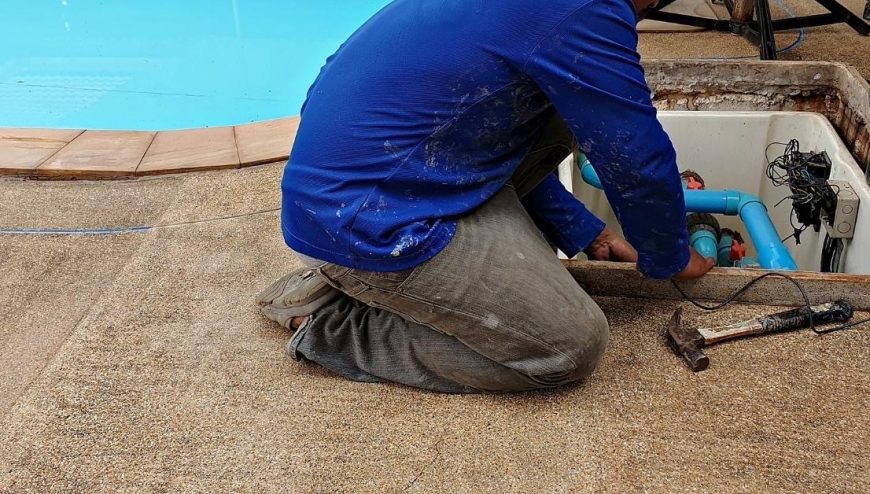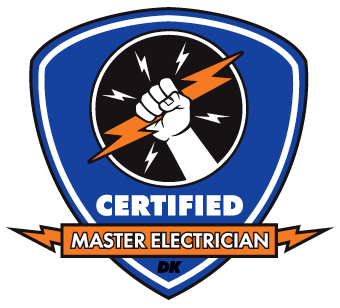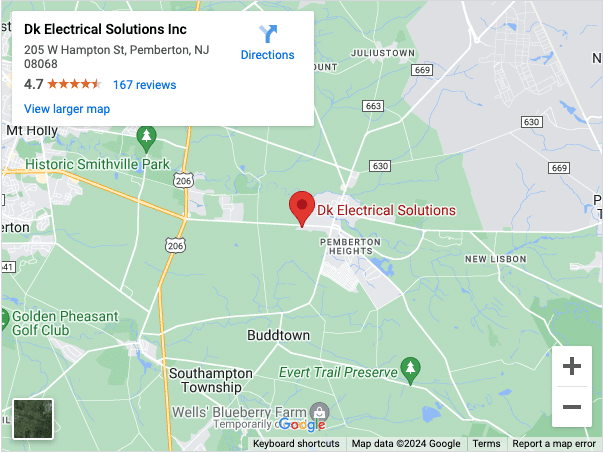
Pool Wiring Services in Southampton, NJ
Having a new swimming pool installed is one of the most exhilarating home upgrades you can make! The electrical installation for the project is less exciting. So, sometimes, as homeowners plan and budget for their new pool, various equipment wiring and other associated electrical needs can be overlooked.
For a permanent above-ground or in-ground pool, all wiring should be installed by or under the guidance of a certified electrician. This applies to any wiring for pool cleaning, heating, lighting equipment, and all other pool electrical needs. Below is some basic information about pool electrical wiring requirements.
Installing Your Pool Wiring
Besides buying a great new swimsuit for your first pool party, there are things to do about the pool wiring. Here are a half dozen basics to be aware of about the pool wiring installation:
Requirements for Pool Wiring
Smaller Pools: If your pool has a 1.5 hp pool pump motor or smaller:
- A 120 V electrical system usually supports it. This is a common setup for typical metal-framed above-ground pools.
- Usually, standard round above-ground pools can be plugged into a GFCI outlet. (GFCI outlets are safety essentials for all swimming pools.)
Larger Pools: A larger in-ground pool with, for example, a 2 hp motor or any larger than 1.5 hp:
- Normally requires a hardwired 240-volt electrical service connection.
- Usually, a homeowner needs a certified electrician to make such line connections.
Dedicated Circuit for Pool Electrical Needs
A large above-ground pool can be expected to have a 1 hp or 1.5 hp motor that runs from 700 to 1500 watts of power. 1500 watts is the amount of a 15-amp circuit.
That means that if you plug in a device or appliance that attempts to consume electricity on that circuit, it will probably trip the breaker.
If the circulation of the pool water is stopped due to a tripped breaker, there is a risk of algae developing. So, installing a dedicated pool circuit is recommended.
If Your Pool is Not Grounded (Bonded)
All swimming pools that require electricity need to be grounded:
Smaller Pools: Usually, pools with plug-in pumps come with an adequate ground that can be plugged into your home’s electrical system.
Larger Pools: For a larger metal-framed above-ground pool, you will probably need to have your pool wiring electrician to bond the pool frame with ground electrodes going directly down into the earth. Or, he/she can run a bond wire back to the ground bar in your home’s electrical panel so that a GFCI will trip if there is a power leak.
GFCI Protection on Pool Wiring
Virtually all residential areas have pool electrical requirements in their building codes. Those typically include circuits carrying electricity for pools. The job of the GFCI is to detect electricity leakage and trip to prevent electrocution. There should also be GFCI protection on all electrical equipment associated with operating the pool, including:
- Pool Light Wiring: Any in-line low-voltage lighting in use, such as pool lighting, accent lighting, rope lighting, etc. that enhances the appearance of the pool.
- Pool Equipment Wiring: Timers, pool heaters, heat pumps, etc., should also be GFCI-protected. For large pool heater wiring, a GFCI breaker is also required.
Total Amps Needed to Run Pool Electrical Equipment
At least a 120/240 V, 60 amp electrical service to a dedicated sub-panel is recommended. That’s because the majority are 15 amp 120 V, with 20 amp 120 V for swimming pool pumps.
However, typically, additional electricity is used for pool heaters, lighting, etc. With GFCI protection on the sub-panel, you can add a heat pump to the circuit that consumes 40 or 50 amps.
Having sufficient amps on your home electrical supply, which means a minimum of 200 amp service, enables you to use 60 amps for your pool without taking the electrical power that you need to run your house.
Size of Electrical Wiring for Pool Pump
Smaller Pools: If you have a smaller pool pump, just a 12 gauge wire and an NMD 90 or Teck cable will be sufficient for a 20 amp circuit. But, for a small additional cost, most homeowners have a 30 amp circuit installed, which gives you a heavier wire (10 gauge).
Larger Pools: If you plan to have a 60 amp sub-panel installed, at minimum, a number 6/3 copper and a Teck cable or NMD 90 is recommended, based on the type of electrical installation and construction in which the pool circuitry will be installed.
For Swimming Pool Wiring – DK Electrical
Wiring your pool at your New Jersey home is a major project that requires expert electrical installation. Working with Master Electricians gets the job done right the first time. DK Electrical Solutions Master Electricians can help. All our workmanship is guaranteed.


